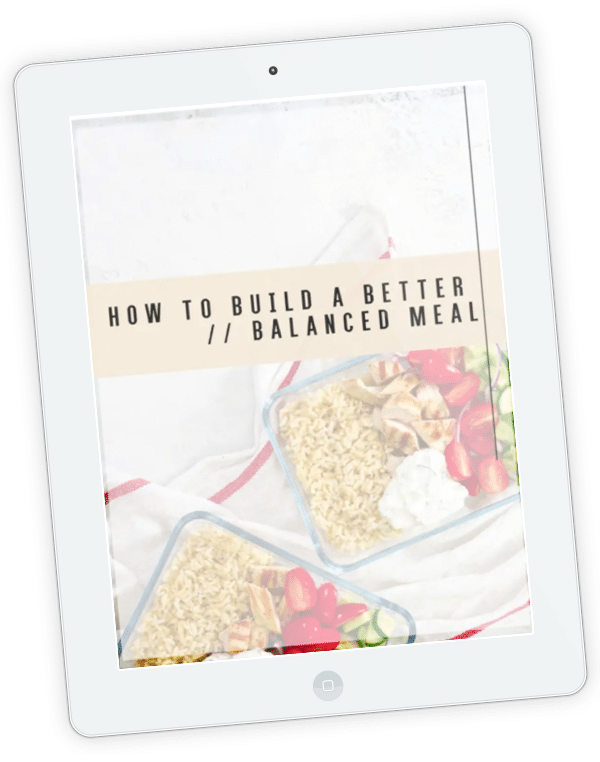How stress leads to weight gain & 4 ways to fight it
Can stress lead to weight gain? In the chaos that is life, it’s easy to spend some nights stressing rather than sleeping. In the meantime, your body is cooking up the perfect recipe to sabotage your waistline. Stress could be one of the culprits.
*This post is sponsored by New Chapter, maker of whole-food vitamins & supplements. All opinions are my own.
Let’s talk about stress, baby
8 in 10 Americans report experiencing some level of stress in their daily lives. Are you one of them?
So, what is stress? Stress is the body’s reaction to any change that requires an adjustment or response. It’s a normal reaction – we all experience stress, some more than others.
Stress can be triggered by your environment or something from within, like your thoughts. Stress usually occurs when the body and/or mind perceive some sort of threat, whether it be from pressures at work or actual danger. But even positive and exciting life changes, like a promotion, can trigger stress.
Stress is subjective – it means different things to different people. What causes stress in my life, like maybe writing this blog post, may not cause stress in your life. You may be better able to handle the stress from impending deadlines, whereas others crack under pressure.
Not all stress is bad. In fact, a lot of it is good! Our bodies were designed to stress. Stress can help you accomplish that project you procrastinated on, prevent an injury, and escape a scary situation. You’ve likely experienced numerous scary or frightening moments, like slamming on your car breaks or jumping when the killer appears in a scary movie.
In the face of something frightening, your heartbeat and breathing quicken, and your body becomes alert, tense, and ready to take action. That’s what we call the “fight-or-flight” response, and it’s a good thing, in small doses. What’s not a good thing? When those small doses of stress happen frequently and constantly. Our bodies, and waistlines, weren’t designed to handle this long-term, chronic stress without consequence.
Key Hormones involved in stress-induced weight Gain
In a stressful situation, the body initiates a chemical response which includes the release of a cascade of hormones. Two key players when it comes to stress and your weight are cortisol and insulin.
Cortisol – the stress hormone
Cortisol is a steroid hormone released by the adrenal glands in response to stress. It’s the body’s primary stress hormone which is why it’s often referred to as THE “stress hormone.” Cortisol release can be triggered by any type of stressor: a late-wake up, a traffic filled commute, an impending deadline, or actual danger. Whatever the cause, when you hit fight-or-flight mode, your body secretes cortisol.
The release of cortisol in times of stress is inherently a good thing. It causes changes in our blood flow, stimulates the liver to produce glucose, and even helps triggers the body to convert proteins and fats into readily available energy. This glucose is meant to fuel the muscles and give the body a natural energy boost for a quick reaction to a threat.
Constant release of cortisol can increase your appetite and cravings for highly palatable foods, like fatty and sugary foods. Cortisol also affects fat distribution by causing more fat to be stored as visceral fat – fat stored around the abdomen.
Bottom line: Chronically elevated cortisol levels can lead to increased appetite, cravings for less healthy foods, and greater accumulation of belly fat. So, for the love of health, keep that stress only for emergencies.
Insulin – the fat storage hormone
Insulin is a hormone made in the pancreas with a main role in regulating blood sugar. It acts as the delivery guy – transporting glucose in the blood to the cells, opening the door, and shuttling the glucose inside so that it may be used as energy. When the cells and liver are tapped out on glucose, excess is stored as, you guessed it, fat.
So, what role does insulin play in the stress-weight gain connection? It ties back to cortisol. Remember, cortisol’s roles in a stressful situation is to quickly mobilize glucose reserves to provide the body with as much readily available energy as possible (in the form of blood sugar).
The last thing it wants is insulin interfering and shuttling all of this glucose into the cells or into the liver to be stored for later, so it essentially renders the cells temporarily insulin resistant. It tells the cells to ignore insulin until the stressor passes, which tricks the body into thinking it needs to make more and more insulin to get that sugar out of the blood. A viscous cycle, I know.
Bottom line: Over time, consistently elevated cortisol, blood sugar, and insulin levels contribute to sustained insulin resistance, which can lead to fat storage (excess unused glucose in the blood is eventually stored as fat). And if that’s not enough to convince you to get zen, when these insulin resistant cells are deprived of energy, they may send false hunger signals to the brain.
Other ways stress leads to weight gain
Sure, short-term “acute” stress can actually curb your appetite… at first. But long-term, chronic stress can eventually lead to the opposite. Here are some other ways stress can lead to weight gain:
- Slows metabolism: You’d think being in fight-or-flight mode would rev up your metabolism, but that might not be the case. Our metabolism seems to slow during stress. In fact, one study found that women who reported being stressed out during the previous 24 hours burned 104 fewer calories than those who weren’t stressed. That difference might mean a weight gain of almost 11 pounds in one year.
- Makes you sleep deprived: Sleep deprivation affects our main appetite-regulating hormones: leptin (the appetite-suppressing hormone) and ghrelin (the hunger hormone). Poor sleep reduces leptin and increases ghrelin, triggering those relentless feelings of hunger, which are too often satisfied with excessive intake of unhealthy foods. Oh, and for the cherry on top, a bad night’s sleep can put you right back on that cortisol train. And we already know we’d like to pass on that train, thank you.
- Decreases motivation: Beyond the hormone story, there are the simple struggles of living life stressed and drowsy. You’re less motivated to exercise, cook, or go shopping for groceries. In fact, the drive through and take out can sound pretty good.
- Impairs digestion: During periods of stress, the blood vessels direct blood to the heart and lager muscles, and digestion is put on the backburner. Because normal digestion isn’t able to occur, it’s common to feel fuller around the waistline during periods of high stress. Although this feeling is likely related to bloat, it can still feel similar to weight gain.
- Changes the gut microbiome: Stress not only affects the functioning of our gut, but also the bacterial residents within it. It’s a somewhat complicated, cyclic relationship. It appears that stress can negatively affect gut bacteria, and these changes in gut bacteria can lead to more stress. Both of which ultimately facilitate weight gain.
4 secrets to stop stress-induced weight gain
Now that you are fully aware of how stress can sabotage your waistline, what can you do to prevent stress-induced weight gain? Here are my top 4 tips:
Exercise
Exercise is a key player in both physical and mental health. Engaging in regular exercise can help you address both stress and weight reduction, so it’s crucial in preventing stress-related weight gain. Physical activity may even “reorganize” the brain so that its better able to cope with stress.
Unfortunately, the thought of incorporating exercise into your routine can also be a source of stress. Don’t feel like you need to sweat for hours on end for it to count as exercise. Even a walk around your neighborhood or a quick 15-minute workout video during your lunch break can pump up your endorphins – your brain’s “feel good” neurotransmitters.
Above all, do what you love, and what suits you and your lifestyle.
Get enough magnesium
Did you know nearly half of Americans are deficient in magnesium? One reason being, drum roll please… stress! Under stress, the body loses more magnesium than usual through urine and sweat. It doesn’t stop there. Stressful conditions require more magnesium use by the body, resulting in a vicious cycle: stress causes magnesium depletion and magnesium deficiency amplifies stress.
You can increase your intake of magnesium by including magnesium-rich foods in the diet, like avocado, whole grains (like quinoa), dark leafy greens, black beans, and chocolate. Try this Instant Pot Chicken Burrito Bowls recipe for an easy weeknight magnesium-rich meal!
Taking a magnesium supplement is also an easy way to get a boost of this nutrient that’s essential for over 300 functions in the body. My personal favorite is New Chapter’s Women’s Magnesium Powder (+ Tart Cherry). It’s an expertly-formulated, highly bioavailable magnesium supplement that has 2.5x better absorption than the leading brand. It contains magnesium bisglycinate, which is a highly absorbable form of magnesium that doesn’t come with unpleasant GI symptoms.
Give your diet a makeover
In addition to increasing magnesium intake, there are other dietary changes you can make to help you prevent AND cope with stress.
- Eat more fish: Fatty fish, like salmon and mackerel, are an excellent source of omega-3’s. Omega-3’s have been shown to reduce distress symptoms and basal cortisol secretion.
- Add ashwagandha: Ashwagandha is an ancient, adaptogenic herb. Research supports ashwagandha’s potential as a natural therapeutic for stress and anxiety. In fact, one study found that Ashwagandha supplementation reduced psychological and physiological markers of stress, improved mental well-being, and reduced serum cortisol level and food cravings in men and women under chronic stress.
- Have healthy snacks on hand: Be sure to have protein- and fiber-rich snacks on hand for when stress-induced hunger strikes. Protein and fiber help fill you up without filling you out, and fiber supports healthy digestion. Some great, simple options are: a banana or apple with nut butter, plain Greek yogurt with berries, or a hard-boiled egg with a handful of grapes.
Catch some zzz’s
The most effective stress-reduction strategy of all? Get some sleep! Your body perceives lack of sleep as a major stressor. But don’t worry, a few nights of solid sleep can help bring you back into balance. Aim for 7 to 9 hours per night. To help you fall and stay asleep, give these techniques a try:
- Take a magnesium supplement before bed. Not only does New Chapter’s Women’s Magnesium Powder (+ Tart Cherry) help support natural calm and relieve stress, it also improves sleep thanks to the addition of tart cherry. Tart cherry provides natural melatonin, which can promote restful sleep.
- Let out some lavender. Lavender supports relaxation and calm, so try out a lavender diffusing oil or pillow spray.
- Engage in relaxation techniques. Try meditation, guided imagery, yoga, or simple breathing exercises before bed. You can find thousands of free guided meditation tracks on YouTube and your music and podcast apps. Try this quick 5-minute meditation.
- Keep coffee for the morning. Caffeine levels can stay high in the blood for 6-8 hours after consumption. Keeping coffee before noon will help ensure plenty of time for a caffeine-free sleep.
- Tone down the bedtime blue light. Put those cell phones away two hours before bed. Turn off Netflix, and read that book you’ve been meaning to for years. Instagram will be there tomorrow.
*These statements have not been evaluated by the Food and Drug Administration. This product is not meant to diagnose, treat, cure, or prevent any disease










